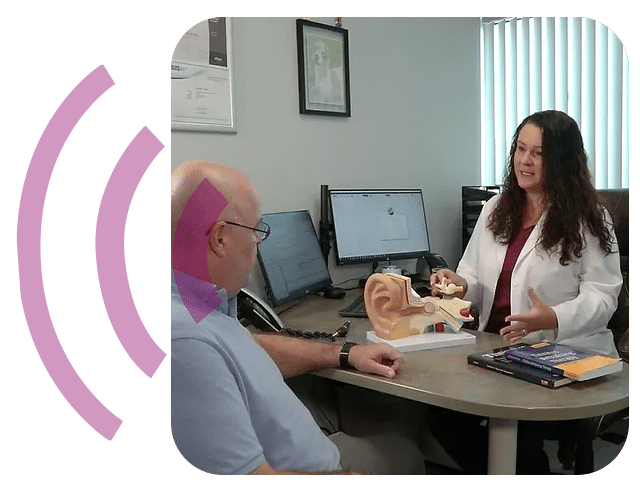
What is Hearing Loss?
Hearing loss makes it difficult to hear soft or subtle sounds, such as the birds outside or high-pitched sounds like women and children’s voices. A common misconception is that those with hearing loss can’t hear anything, but that is not true. People with hearing loss can hear they just lack clarity to make out certain words or to hear when there is competing background noise.
When left untreated, hearing loss can have negative effects on overall health and well-being. When you can’t hear well, you may begin to withdraw from social settings and other people. Over time, this can lead to social isolation, depression, anxiety, forgetfulness, and cognitive decline.
For individuals over the age of 55, it’s important to schedule regular hearing check-ups to catch the signs of hearing loss early. Treating hearing loss at the first signs can prevent your loss from worsening and can preserve your cognitive abilities.
Signs of Hearing Loss
Hearing loss often occurs gradually, making it difficult to recognize right away. On average, people wait 10 years before they seek treatment for hearing loss. Learn how to recognize the signs on your own so you can be proactive about your hearing health.
- It seems like everyone around you mumbles
- Sounds seem muffled
- You frequently ask people to repeat themselves
- It’s harder to hear when there is background noise
- You have to turn the volume way up on the TV or radio
- You miss parts of the conversation
- You hear a ringing in your ears
Hyperacusis & Misophonia
Hyperacusis, also known as sound sensitivity, is when everyday sounds are extremely irritating. This hearing disorder is rare – only affecting 9% of adults. Treatment for hyperacusis can vary on the individual and the cause. Sound therapy through the use of sound generators and one-on-one counseling can help stop central gain and retrain the brain’s auditory processing center to accept normal sounds.
Similar to hyperacusis, misophonia is an extreme sensitivity to sounds that can result in pain or adverse reactions. Misophonia can be so severe it affects the individual’s ability to concentrate, learn, and interact with others. Treatment includes the use of sound generators, Cognitive Behavioral Therapy, and counseling.
If you or someone you know suffers with hyperacusis or misophonia, we can help. Contact us to schedule an appointment with Dr. Woods.
Tinnitus
Almost everyone experiences tinnitus in their lifetime. But, for some people tinnitus is so severe and constant it can affect their concentration, sleep, and quality of life. The symptoms of tinnitus can vary greatly but the common sounds people hear are buzzing, humming, ringing, or whistling in the head or ears.
In severe cases, we recommend taking a tinnitus assessment (or tinnitus test) to determine the best management plan for you. We offer Tinnitus Retraining Therapy at both our Nashua and Londonderry offices. If you have tinnitus that is affecting your quality of life, contact us today.


